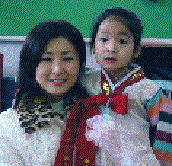No.196-5
| Profile of Meguro UNESCO’s Japanese Language Classes
|
We all know that some Japanese people have studied English hard for twenty
years, yet are unable to actually use it in speech. How amazing then, to
see the following accomplishments of Meguro UNESCO’s students of Japanese.
To feel the rhythm of the seven-five-syllable meter that Japanese people have long cherished as the pulse of their language, we gave the students a taste of some Japanese poetic forms including tanka, haiku, and senryu. We then encouraged them to compose their first poem in this rhythm, without worrying about rules. How do these poems impress you?
青い空 赤い花びら 春がきた
(By Youn Kyong Sook)
Aoi sora / akai hanabira / haru ga kita
Translation: The blue sky / red petals / spring has come
(Composed when the writer looked up at plum blossom in a
park)
日本に来て 2年も経つのに まだ遠い
(By Cho Soo Hyon)
Nihon ni kite / ninen mo tatsu noni / mada t?i
Translation: I’ve been in Japan / for two years, and still / it’s a
far country
(Yet we know she is trying to come closer.)
雪が降り 風まで強い 春はどこ
(By Jeoh Eun Sun )
Yuki ga furi / kaze made tsuyoi / haru wa doko
Translation: It’s snowing / even the wind is strong / where is spring?
(Composed when the writer visited Gunma Prefecture)
外人が タクシー乗って 渋谷駅
着いてから 見せた紙には 日比谷駅
(By Seo Young Hwa)
Gaijin ga / taxi notte / shibuya eki /
Tsuite kara / miseta kami niwa / hibiya eki
Translation: A foreigner / took a taxi / to Shibuya Station /
Then he showed / a piece of paper / that said
Hibiya Station
(Based on a story told by a taxi driver)
大井町 人が多くて 多い町
(Contributed by Seo-san’s daughter, second grader )
Oi machi / hito ga okute / oi machi
Translation: oi-machi / has so many people / it is called
“Town of Many”
 Time flies. It has been a year and a half since I came to Japan. I can't stop giggling to myself, when I remember the first day I attended the Japanese language class at UNESCO. I took a long while in the class, as I had little vocabulary, but still I could not explain to the class what I wanted to say. Well, that still happens even nowadays
Time flies. It has been a year and a half since I came to Japan. I can't stop giggling to myself, when I remember the first day I attended the Japanese language class at UNESCO. I took a long while in the class, as I had little vocabulary, but still I could not explain to the class what I wanted to say. Well, that still happens even nowadays
I feel happy, because the class teacher teaches us communicating various topics in Japanese. My impression of Japan changed a lot since I came to Japan. Before I was here, the Japan I knew was only the knowledge from history textbooks, which had inferior images of Japan. But as I studied Japanese language, understood Japanese culture and society, and became friends with many people, Japan became such a familiar country to me. Moreover, I enjoyed speaking in Japanese.
I have an experience living in English. But how can I say I could not express my feelings enough in English as if I could hear wind blowing in my heart. I may have told you once before: my favorite Japanese word is "natsukashii"(adj. dear, beloved, sweet). Natsukashii expresses my inner feeling, much more than my mother tongue. I dearly long for my mother country when I am living in foreign country. I think I understand the meaning of Japanese not by my head but my heart. That's why I like to read Japanese novels. I really appreciate having an opportunity coming to Japan and learn Japanese.
After I came to know volunteer teachers of UNESCO, I found what I want to do in the future. When I go back to Korea, I want to help Japanese people living in Korea. In such a way, I want to express my appreciation to the people who helped me in Japan.
I enjoyed studying in G class. I was happy to meet such a wonderful teacher and classmates. I will never forget the teacher who always taught me with a smile. Thank you very much!! Meguro UNESCO Association Japanese Class
So Yonfa
Original message written in Japanese. This message was sent to UNESCO staff.
to next page
